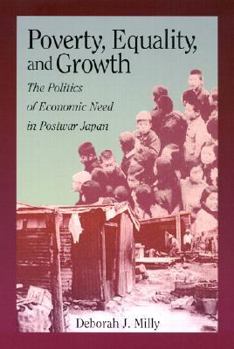Poverty, Equality, and Growth: The Politics of Economic Need in Postwar Japan
(Book #174 in the Harvard East Asian Monographs Series)
In contrast to the large indigent population in Japan in the 1950s, very few Japanese live in poverty in the 1990s. This text explains the Japanese government's decision to respond to poverty by promoting equality as the basis for a social compromise. Deborah Milly argues that to account for why and how political actors crafted a programme that won acceptance, we must look beyond them and identify how they relied on knowledge and normative arguments...
Format:Paperback
Language:English
ISBN:0674009584
ISBN13:9780674009585
Release Date:September 2002
Publisher:Harvard University Press
Length:416 Pages
Weight:1.25 lbs.
Dimensions:1.0" x 6.4" x 9.0"
Customer Reviews
0 rating





